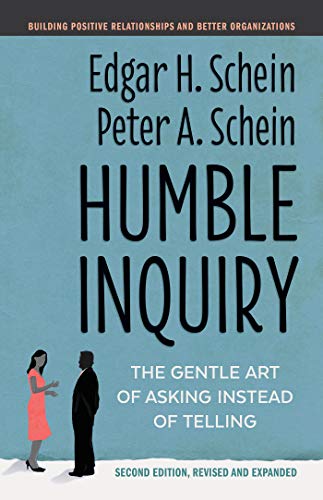Humble Inquiry: The Gentle Art of Asking Instead of Telling

When I first started reading about humility, I was struck by the idea “power held in service to others.” Edgar Schein’s Humble Inquiry: The Gentle Art of Asking Instead of Telling brings that power through asking questions. He proposes that when we’re inquiring, we can become vulnerable and therefore humble to others.
Problem Solving
While it’s nice to be perceived as the person with all the answers, the truth is that no one has all the answers. The most powerful thing to do when working with someone else is to try to understand them, the situation, and the options – and that means a lot of questions. While some resources, like The Ethnographic Interview, are focused on the mechanics of the questions to ask and the approaches to take, Humble Inquiry is much more focused on the stance that one should take.
In Humilitas, John Dickson writes that humility is “power held in service to others.” For me, that means that a powerful person makes no fuss about the power they hold, nor do they wield it for their own needs; instead they leverage their power to help others be successful. Robert Greenleaf calls it Servant Leadership. Liz Wiseman calls the managers that exhibit these traits Multipliers. Edward Schein speaks about being vulnerable by asking questions. Vulnerability builds trust.
Building Trust
Building trust is absolutely essential in life. Whether we view trust from multiple levels as Trust: Human Nature and the Reconstitution of Social Order or something much more practical like in Trustology, without trust, there’s no foundation for society to build on. I’ve covered the relationship between trust and vulnerability a few times, most recently in Trust=>Vulnerability=>Intimacy, Revisited. Schein’s perspective is that creating the vulnerability is an essential part of the relationship process.
If working in organizations is like therapy, the research supports this perspective. The Heart and Soul of Change explains how therapeutic alliance – the relationship between the therapist and client – is the most important indicator of therapeutic success.
Status
By being vulnerable – appropriately vulnerable – we remove the power gradient and gap in status between ourselves and the other person. By being vulnerable, we remove the status and move to a space of shared humanity. Instead of the differences between us, we focus on the commonality. We’re all vulnerable. We’re all struggling to figure this life out. That’s our common human experience.
By asking questions, by becoming curious about the other person’s experience, we expose our lack of knowledge and invite the conversation in ways that makes us able to learn – and learning is vulnerability, as we challenge our existing beliefs and understanding.
Choosing to Explore Us
When we’re vulnerable, we’re exploring us. Instead of being focused either on ourselves or the other person, we focus on the relationship between us and the ties that bind us together. Martin Buber wrote I and Thou as a call to shift our thinking from us and them to the relationship between us all. The society of today is focused on rugged individualism and self-sufficiency. These are, of course, complete illusions. Everyone is dependent upon someone else for food, electricity, water, or something. We’ve never been completely independent, and we’re not designed that way. (See The Righteous Mind.) It’s only when we can learn to accept healthy interdependence that we can really begin to connect with others in a meaningful way.
Management Is Not Power
The opposite of connection is disconnection – or possibly oppression. One of the things that I sometimes hear people say is that they want to rise into management so they can tell other people what to do. They want to develop power over others and become a part of the most dysfunctional form of organization we know of. (See Reinventing Organizations.) Beyond the organizational impacts, the idea that you would become a manager to hold power over others is morally wrong and is how we end up with the atrocities that we find in history. (See The Lucifer Effect and Moral Disengagement.)
Management is about helping people be effective. (See Multipliers.) When we find people who are more concerned with their own power and less with how they help humanity, we know that we’ve found a person who is not ready to become a leader – and shouldn’t be a manager either. (See Servant Leadership.)
ORJI Cycle
There are many cycles for continuous improvement, most notably Deming’s PDSA/PDCA cycle. The cycle highlighted in Humble Inquiry is different, yet similar. ORJI – Observe, React, Judge, Intervene – is about how we continue to improve the quality of our communications and verify that what we believe to be the truth is the truth – or at least the other person’s truth.
The ORJI cycle is, I believe, best coupled with Chris Argyris’ ladder of inference and consciously looking for places where we’ve walked – or jumped – up the ladder, which leads us to the wrong conclusions. (See Choice Theory for more.)
Decrease Learning Anxiety
Executed well, Humble Inquiry can reduce the greatest barrier to growth, which is the anxiety associated with learning. To some degree, all of us have some level of anxiety about learning. We are afraid that we’ll be shown as stupid for not knowing something or that one of our deeply held beliefs will be proven incorrect. Humble Inquiry, practiced well, can gradually reduce these anxieties and free us into the place of becoming the best we can be. (See Peak for more on being the best.) Maybe it’s time for you to develop a curiosity for Humble Inquiry.
